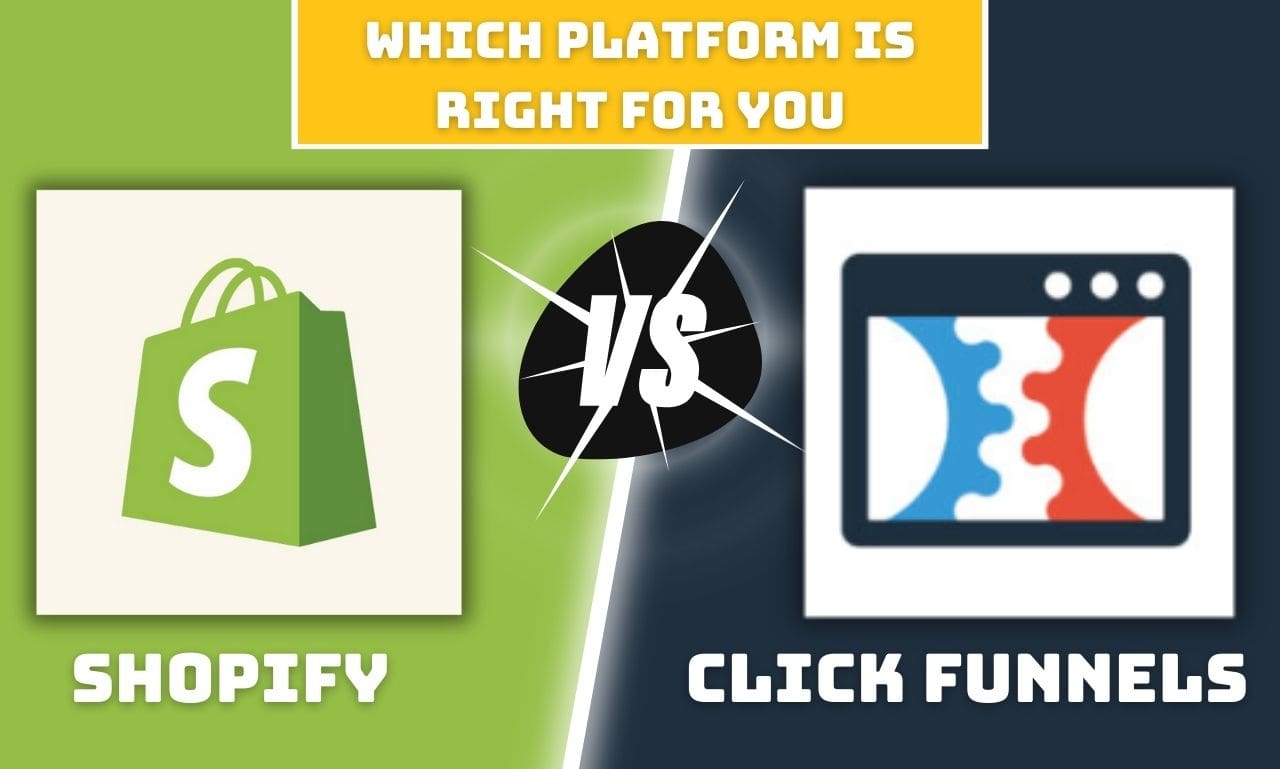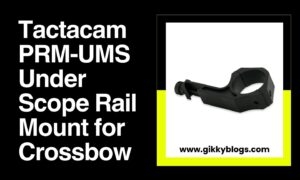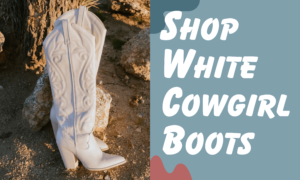Choosing the right platform for your online business is a monumental decision. You’re entrusting it with the soul of your brand, your precious inventory, and ultimately, your sales. The two names that inevitably rise to the top in this digital arena are ClickFunnels and Shopify. They both promise ecommerce glory, but which one truly walks the walk?
Fear not, intrepid entrepreneur, for this epic showdown will lay bare their strengths, weaknesses, and hidden talents, guiding you towards the perfect match for your business ambitions.
Table of Contents
1. Clash of Titans: Defining the Battlefield
Before we dive into the feature frenzy, let’s understand the core philosophies of these platforms.
ClickFunnels: Think of ClickFunnels as your ultimate sales funnel architect. It’s all about crafting targeted, step-by-step journeys that guide potential customers from curiosity to conversion. From landing pages and order forms to upsells and email sequences, ClickFunnels orchestrates the entire sales dance with laser focus.
Shopify: Shopify, on the other hand, is your ecommerce empress. It’s a comprehensive platform built to showcase your products in all their glory, manage inventory like a pro, and handle every aspect of order fulfillment. Think beautiful storefronts, seamless checkout experiences, and built-in marketing tools, all under one roof.
2. Building Your Empire: Feature Feast
Now, let’s delve into the nitty-gritty of features, comparing their strengths and weaknesses in key areas:
Sales Funnels and Landing Pages:
- ClickFunnels: This is ClickFunnels’ bread and butter. It boasts a vast library of pre-built funnels for nearly every niche, plus intuitive drag-and-drop tools for custom creation. Think webinars, squeeze pages, and order bumps, all designed to maximize conversions.
- Shopify: While not its core focus, Shopify offers basic landing page creation and funnel building through apps and integrations. It’s more suited for product-centric pages than ClickFunnels’ laser-focused sales sequences.
Product Management and Inventory:
- ClickFunnels: This is where ClickFunnels takes a backseat. Its product management features are basic, geared towards simple digital products and services. Inventory management is practically non-existent.
- Shopify: Shopify shines in this domain. It offers robust inventory management, product variations, and even wholesale and subscription functionalities. Think detailed product descriptions, bulk edits, and real-time stock tracking.
Design and Customization:
- ClickFunnels: While not as flexible as Shopify in terms of raw design control, ClickFunnels offers a good selection of pre-designed templates and customization options. Think cohesive themes, color palettes, and basic branding adjustments.
- Shopify: Shopify gives you more design freedom with access to HTML and CSS editing, plus a wider range of themes and third-party app integrations for truly unique storefronts. Think bespoke layouts, custom fonts, and intricate branding elements.
Marketing and SEO:
- ClickFunnels: While not an SEO powerhouse, ClickFunnels offers built-in email marketing tools, A/B testing, and analytics to optimize your sales funnels. Think email sequences, lead magnets, and conversion tracking.
- Shopify: Shopify has more built-in SEO features like sitemap generation, meta descriptions, and blog functionality. But for advanced SEO campaigns, you’ll need additional apps and integrations. Think keyword research, content optimization tools, and backlink building strategies.
3. Crunching the Numbers: Price Points and Payoffs
Now that we’ve explored the feature landscape, let’s talk about the cold, hard cash. Pricing can be a dealbreaker, so understanding each platform’s cost structure is crucial.
ClickFunnels:
ClickFunnels offers two main pricing tiers:
- ClickFunnels Basic: Starting at $97 per month, this plan grants access to all the core features like funnels, landing pages, email marketing, and basic analytics. However, it limits you to 20 funnels, 100 pages, and 20,000 contacts.
- ClickFunnels Platinum: For $297 per month, you unlock unlimited funnels, pages, contacts, and additional features like priority support, webinar hosting, and access to Actionetics email marketing automation.
Shopify:
Shopify has a wider range of pricing plans to cater to businesses of all sizes:
- Basic Shopify: Starting at $29 per month, this plan is suitable for small businesses with a limited product lineup. It includes all the ecommerce essentials like online store, unlimited products, and basic marketing tools.
- Shopify: The $79 per month plan offers more features for growing businesses, such as discounted shipping rates, gift cards, and abandoned cart recovery.
- Advanced Shopify: At $299 per month, this plan caters to high-volume businesses with advanced needs. It includes advanced reporting, carrier calculated shipping, and third-party calculated shipping rates.
The Verdict on Pricing:
ClickFunnels’ pricing is relatively straightforward, but it can be expensive for businesses with low sales volume or high email subscriber counts. Shopify’s tiered pricing offers more flexibility, making it a better choice for businesses on a budget or with a large product catalog.
Ultimately, the best pricing option depends on your specific needs and budget. Consider your business size, sales volume, email list size, and desired features before making a decision.
4. The Final Verdict: Who Wears the Ecommerce Crown?
So, who emerges victorious in this epic showdown? The truth is, there’s no one-size-fits-all answer. Both ClickFunnels and Shopify excel in different areas, and the best choice for you depends on your unique business goals and priorities.
When ClickFunnels Rules the Roost:
- Your focus is on sales funnels and lead generation.
- You sell primarily digital products or services.
- You want a user-friendly platform with pre-built funnels.
- Budget isn’t a major concern.
When Shopify Steals the Show:
- You have a physical product inventory to manage.
- You need a scalable platform for future growth.
- You prioritize design flexibility and customization.
- You want built-in SEO and marketing tools.
The Synergistic Solution: Combining Forces for Ultimate Domination
For some businesses, the ultimate ecommerce domination strategy might lie in combining the strengths of both platforms. Here’s how:
- Use ClickFunnels for targeted sales funnels and lead generation.
- Connect your ClickFunnels leads to your Shopify store for seamless conversion.
- Leverage Shopify’s robust product management and marketing tools.
This hybrid approach can give you the best of both worlds: powerful sales funnels to attract leads and convert them into customers, and a versatile ecommerce platform to manage your products and grow your business.
5. Bonus Round: Hidden Gems and Expert Insights
ClickFunnels Hidden Gems:
- ClickFunnels One-Click Upsells: This powerful feature allows you to instantly offer upsells and downsells to your customers after they purchase a product, increasing your average order value.
- ClickFunnels Backpack: This affiliate marketing tool lets you recruit affiliates to promote your products and earn commissions on their sales.
- ClickFunnels Actionetics: This advanced email marketing automation platform allows you to create sophisticated email sequences that nurture leads and convert them into customers.
Shopify Hidden Gems:
- Shopify Script Editor: This built-in code editor allows you to customize the functionality of your store without needing to know any coding.
- Shopify Analytics: Shopify’s robust analytics dashboard provides you with detailed insights into your store’s performance, helping you make data-driven decisions.
- Shopify App Store: The Shopify App Store boasts over 6,000 apps that can extend the functionality of your store and add new features, from abandoned cart recovery to social media marketing.
Expert Insights:
- Focus on Your Niche: When choosing a platform, consider your specific niche and the features that are most important for your business. For example, if you sell digital products, ClickFunnels’ focus on sales funnels might be a better fit than Shopify’s emphasis on physical products.
- Start Small and Scale: Don’t try to do too much too soon. Start with a basic plan and gradually add features and functionality as your business grows.
- A/B Testing is Key: Continuously test different elements of your funnels and storefronts to see what resonates with your audience and drives the best results.
- Build a Community: Engage with your customers and build a community around your brand. This will help you create loyal customers who will come back for more.
- Stay Up-to-Date: The ecommerce landscape is constantly evolving, so it’s important to stay up-to-date on the latest trends and technologies.
By following these bonus tips and expert insights, you can increase your chances of success in the competitive world of ecommerce.
Remember, the most important thing is to choose a platform that you are comfortable with and that meets the needs of your business. With the right platform, the right mindset, and the right hustle, you can build a thriving online empire.






